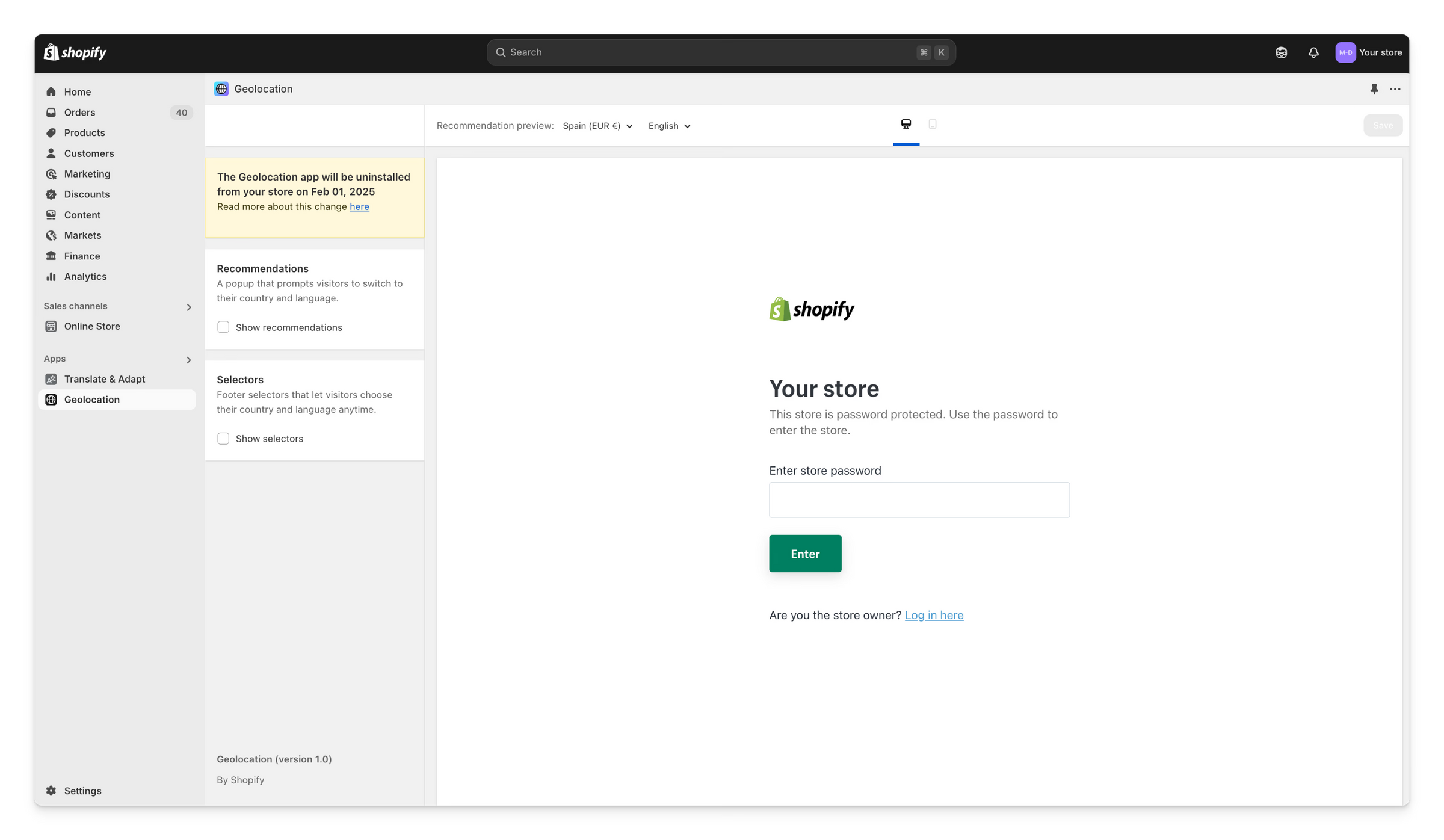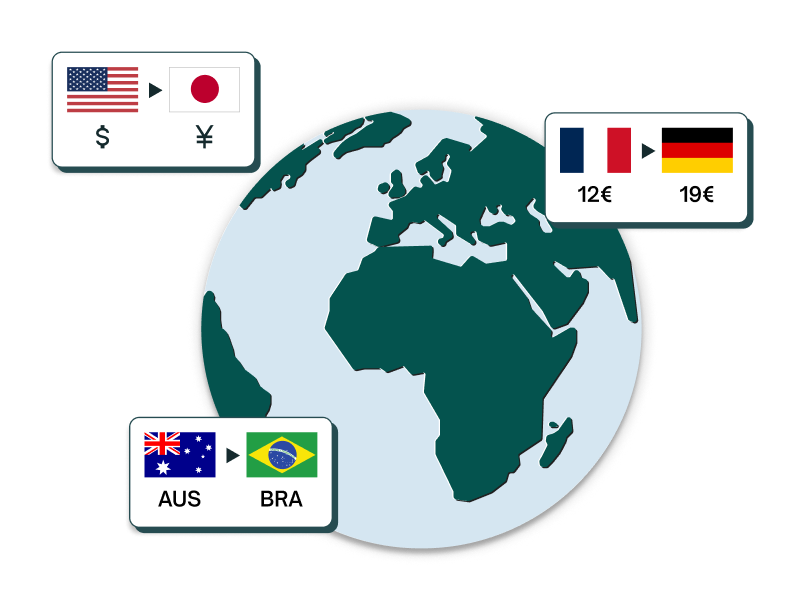Shopify’s Geolocation App is Sunset: What It Means for Your Store
Shopify’s Geolocation app will be sunset on March 24, 2025, and removed from all stores. Here’s what you need to know about the Shopify Geolocation removal.

What’s happening?
In February 2024, Shopify announced the retirement of its free Geolocation app, effective March 24, 2025.
- Since November 2024, the app has been unavailable for new installations.
- On the sunset date (March 24, 2025), Shopify will automatically remove the app from stores where it’s still active.

Why is Shopify removing the Geolocation app?
Shopify has introduced built-in automatic redirection for country and language selection within Markets settings. Merchants can enable this feature in:
- For Markets 1.0, you can enable automatic redirection in Markets Preferences.
- For Markets 2.0, this setting is available in Online Store Preferences.
According to Shopify, these platform advancements aim to simplify the solution for most merchants, reducing the need for consent-based localization.
However, while this works for stores with basic internationalization needs, merchants with significant international sales should carefully evaluate their geolocation strategy. Ensuring that customers land on the right store experience is key to maximizing conversions and providing a seamless shopping journey.
Shopify itself acknowledges that merchants using EU-specific top-level domains (e.g., .fr, .de) require a third-party solution to remain compliant with European regulations. Additionally, automatic redirection may not be suitable for businesses operating with multiple expansion stores or those relying on SEO, paid traffic, or marketplace feeds.
Below, we break down the key limitations of Shopify’s automatic redirection and why merchants with a global audience should consider alternative solutions.
The best geolocation alternative: Orbe

Limitations of Shopify’s automatic redirection
Shopify’s automatic redirection may seem like a simple solution, but it has critical flaws for merchants with a global customer base. The lack of user consent and one-time-only redirections can disrupt the shopping experience and impact key business metrics.
1. SEO Challenges
Most major web crawlers, including Googlebot, operate from U.S.-based IP addresses and don’t attempt to vary their location when indexing websites. As a result, if a store uses automatic redirection, search engines will always be redirected to the U.S. version of the site, preventing them from properly crawling and indexing country-specific versions.
Google explicitly warns against this practice in its official documentation:
Avoid automatically redirecting users from one language version of a site to a different language version of a site… These redirections could prevent users (and search engines) from viewing all the versions of your site.
This means that Shopify’s automatic redirection not only affects users but can also block search engines from properly crawling your store, leading to:
- Only one store version (e.g., US) gets indexed, limiting international visibility.
- Localized pages for other markets may not appear in search results.
- SEO rankings suffer as search engines can’t recognize regional versions of the site.
2. Issues with Google Merchant Center & marketplaces
For merchants running Google Shopping campaigns or listing products on Meta, or other marketplaces, Shopify’s automatic redirection can lead to serious feed mismatches—and even penalties.
These platforms expect product feeds to match exactly what users see when they visit your store. However, because web crawlers (like Google’s bots) don’t follow automatic redirections, they may only index the default version of your site—usually the U.S. store.
This can cause pricing and currency mismatches, leading Google to flag your country feeds for violating its policies.
3. Forced redirection frustrates customers
Shopify’s redirection relies solely on IP detection, meaning customers have no choice in their shopping experience.
Example: A UK customer traveling in France who wants to shop on the UK store will be forced onto the French store, even if they prefer the UK experience.
This can frustrate users who:
- Are expats or frequent travelers.
- Want to purchase gifts for someone in another country.
- Use VPNs or work remotely, which may trigger incorrect redirects.
4. Redirection happens only once
Shopify’s system only redirects customers the first time they visit. If they later return to the wrong domain, they are stuck there without any additional redirection. Moreover, there could also be some leakage points in links inside the website that accidentally move the user to their incorrect country experience. This is:
- Bad for returning customers who accidentally land on the wrong version of the store. An example is a user who accesses the store again from an Instagram link.
- Increase the bounce rate, as users perceive that the product, prices, or currency are mismatched with their shipping country or language.
5. Data Protection Laws Compliance Issues
As Shopify describes in their changelog, merchants using EU top-level domains (e.g., .fr, .de) must use a third-party app for redirection, as Shopify explicitly recommends.
Some countries prohibit redirecting users to a specific local experience without their consent. To meet these regulations, Orbe integrates with each store to ask customers where they want to buy and recommend the best shopping experience based on their location and preferences. After Orbe saves the permission for subsequent visits, the popup doesn’t bother again.
These data protection laws include, among others, the European Union (GDPR), California (CCP), or Brazil (LGPD).
6. Incompatibility with Multiple Expansion Stores
For brands operating multiple Shopify stores (e.g., separate stores for the US, UK, and EU), Shopify’s automatic redirection doesn’t support cross-store redirection. Customers may land on the wrong store without a way to switch easily.
How to Ensure a Seamless Geolocation
With the removal of Shopify's Geolocation app, merchants are now depending on Shopify's built-in automatic redirection.
However, for those who sell a significant volume of products internationally, a more precise and flexible approach is necessary to ensure that customers have the right shopping experience.

For merchants with a significant international presence, ensuring that visitors see the correct store version at all times is critical. This is where Orbe comes in.
Orbe is the most trusted geolocation app. Here’s how:
- User consent and persistent redirection – Customers always shop in the correct experience for their country, even if they switch domains or revisit the site. No more forced redirects based only on IP.
- SEO-friendly redirection – Ensures search engines properly index your store while maintaining compliance with Google Merchant Center and Meta, avoiding feed disruptions and penalties.
- Continuous redirection throughout the customer journey – Unlike Shopify’s one-time redirection, Orbe keeps users in the correct store version at all times, ensuring a seamless shopping experience.
- Multi-store support – Seamlessly connects multiple Shopify stores, automatically redirecting customers to the right one, ideal for brands with multiple expansion stores.
- Full EU compliance – Supports GDPR-friendly consent-based redirection, essential for merchants using country-specific domains like .fr, .de, .es, ensuring compliance with regional regulations.
- Localized welcome pop-up – Displays key information tailored to each country upon entry, including customs, taxes, shipping costs, and delivery times, increasing trust and reducing cart abandonment.
- Klaviyo integration – Syncs customers' preferred language and country to your CRM, enabling personalized email campaigns, abandoned cart recovery, and localized transactional emails.
- Priority support and developer tools – Advanced settings, detailed documentation, and expert assistance to fine-tune geolocation strategies for international brands.
As Shopify phases out its Geolocation app, merchants need to take control of their international strategy. Ensuring customers land on the right store, in the right language, with the right pricing is crucial for maximizing conversions and maintaining a seamless shopping experience.

